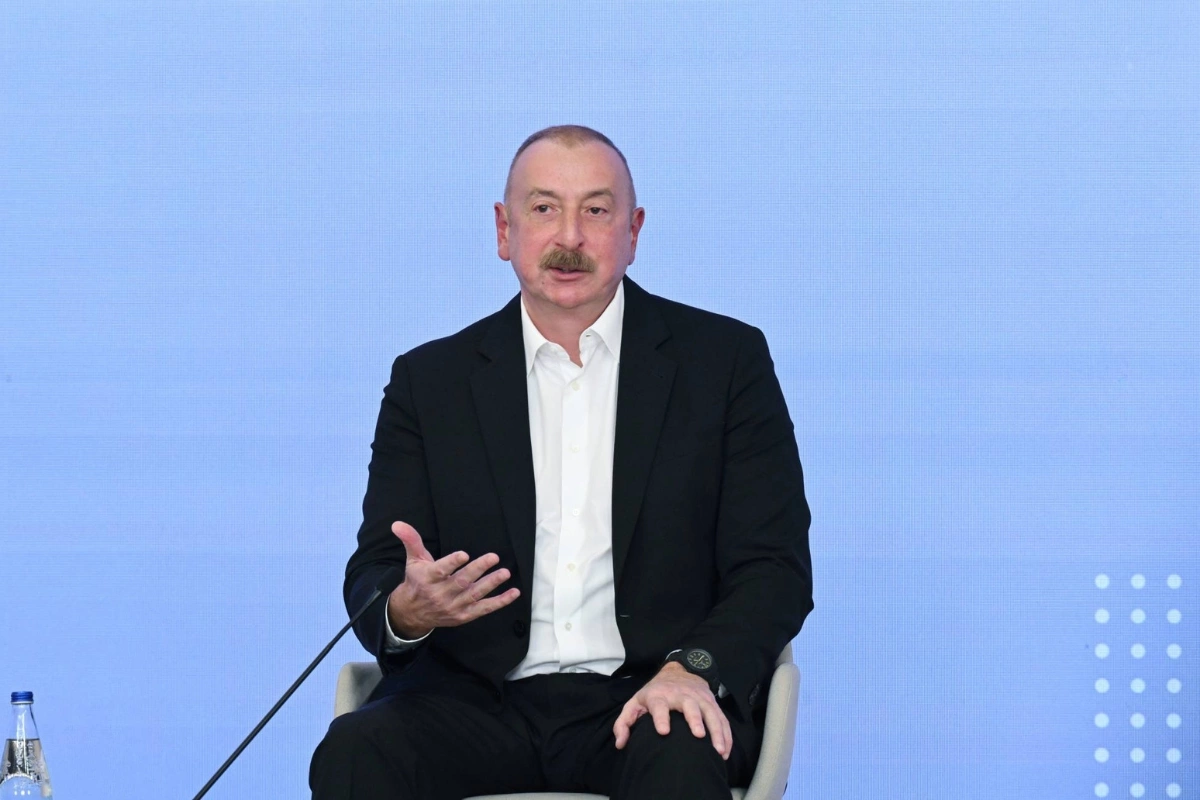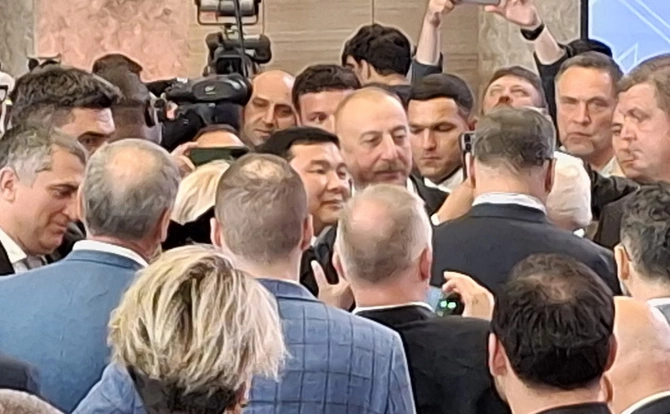
Azerbaijani President Ilham Aliyev has clarified two important obstacles remaining in the path towards a full agreement of peaceful co-existence with Armenia: the dissolution of the OSCE Minsk Group and the need for a small but crucial change in the Armenian constitution.
Image: president.az
Armenia needs to tweak its constitution to remove reference to ‘unification’ with former Nagorno-Karabakh, Azerbaijan’s President Ilham Aliyev told a gathering of world journalists - including correspondents from the Caspian Post. Aliyev reassured his audience that “80-90 percent” of the text of a future peace agreement is already in place. However, he said, “the constitution of Armenia contains references to the Declaration of Independence, which clearly presents a territorial threat to Azerbaijan, as it speaks of uniting the so-called Nagorno-Karabakh with Armenia.”
“So, as long as this clause exists, a peace agreement is impossible… I want everyone to understand me correctly. This is absolutely not interference. But with this clause in their constitution, the agreement is impossible because the constitution is above any other document, including international treaties. Therefore, we do not want to end up in a situation where they might change their mind one day, and we would have to do what we did in September once again.”
The other key stumbling block he outlined was for Armenia to “respond to our proposal” to ask the OSCE to disband the Minsk Group. That’s the multilateral organization set up in 1992 as a mechanism to bring a peaceful solution to the Karabakh conflict. For nearly 30 years, Minsk Group co-chairs France, the US, and Russia ostensibly made efforts to find a solution to the Karabakh issue and did manage to facilitate a channel of conversation between Armenia and Azerbaijan. However, the lack of progress, along with the group’s failure to demand meaningful concessions from Armenia – which at that stage occupied around 16% of Azerbaijan’s territory – meant that no substantive progress was made. Eventually, the Second Karabakh War radically changed the goalposts, with Azerbaijan regaining its occupied territories in 2020. Now for Baku, the continued nominal existence of the Minsk Group is unhelpful. From Azerbaijan’s perspective, the conflict that the group was created to solve is now completely solved, so the group’s continued existence is negative in suggesting that there are still elements of that conflict that need such a forum to discuss.
Besides, as President Aliyev reminded the audience, the group “has been effectively inactive for the past couple of years.”
“There is no chance that the Minsk Group will become functional again. Firstly, because the co-chairs are currently practically at war with each other, I mean, two against one. Secondly, France has completely lost the chance to be a mediator or even to be present in the South Caucasus because they cannot act in the region without our consent. If they try to do so without our consent, they will fail again. And this will be yet another painful defeat for them. What is the point of maintaining the Minsk Group de jure under these circumstances?”
Aliyev’s comments were made while answering questions at the Second Shusha Global Media Forum, a gathering of journalists from 50 countries who were offered the remarkable opportunity to quiz the president for


A relaxed President Aliyev mingles with international journalists at the Shusha International Media Forum. Image: CP
On the US election, Aliyev was understandably tactful in not specifically backing a candidate but noted that working with the previous Trump administration had been fruitful for Azerbaijan. Aliyev also intrigued the journalist audience by saying that he agreed fully with Donald Trump when he called the Washington Post and New York Times “sources of fake news” – after all, Azerbaijan had been subjected to decades of western media coverage that was widely perceived as biased towards Armenia. Indeed, the forum’s 2024 theme focused specifically on unmasking false narratives, misinformation, and disinformation in the media.
The president made much of Azerbaijan’s role as a bridge between the global north and south, building on Baku’s experience heading the Non-Aligned Movement and building towards its role as host of COP29 in November. Addressing the perception that it was somehow inappropriate for a hydrocarbon producing country to be leading COP, he pointed out that here again there was a narrative bias – similar accusations having been made against the UAE for COP28 in Dubai but no such theme emerging for COP26 in Glasgow, even though Scotland too is a major oil producer.
Aliyev made a thought-provoking analysis of the EU’s double-edged requests for Azerbaijani gas supplies to be ramped up, with Baku being simultaneously pressed to increase pipeline capacity but being shut out of investment eligibility due to EU rules against hydrocarbon funding. In astonishing detail, given the total lack of notes, Aliyev gave a series of facts and figures demonstrating the country’s rapid investments in green energy, balancing continued hydrocarbon production with an increasing ability to export sustainably produced electricity – possibly to be supplemented with supplies from Uzbekistan and Kazakhstan via sub-Caspian cable.
As the name suggests, the forum event was held in Shusha, the Karabakh city regarded by Azerbaijan as its cultural capital. Shusha had been under Armenian occupation from the 1990s until regained at the culmination of the Second Karabakh War. Left in almost total ruins, the city has been undergoing a massive reconstruction – a process that, while far from complete, is proceeding at a remarkable rate. The city’s three hotels were full to capacity for the event, which also highlighted the breadth of Azerbaijani cultural endeavours with a gala dinner featuring singers and musicians performing in numerous contrasting genres, from classical opera to ashiq to upbeat pop tunes played on the tar.
Share on social media
Azerbaijani President Ilham Aliyev has clarified two important obstacles remaining in the path towards a full agreement of peaceful co-existence with Armenia: the dissolution of the OSCE Minsk Group and the need for a small but crucial change in the Armenian constitution.